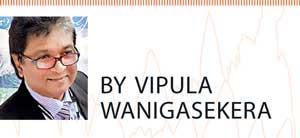30 Jun 2016 - {{hitsCtrl.values.hits}}

Many business leaders are getting less interested in ‘post knowledge’ when adapting strategies whether they are presented in a work environment or academically. Post knowledge is a mix of conditioned thoughts and beliefs emerging from the past into the future based on which managers take strategic and operational decisions assuming that the past offers valuable lessons. However, no direct correlation has been found between the ‘post knowledge’ and success in real life.
Instead, business leaders tend to increasingly depend on creativity which is reckoned to be a forerunner to accomplishments of organisations and entrepreneurs in their continuous endeavours to find a ‘blue ocean’ where there are no competitors who could throw them out of business overnight.
How does creativity arise?
Today, most heads of organisations measure the performance of their subordinates inter-alia, on their creative ability (or innovativeness) when performing their tasks. Academia as well as business leaders use the words ‘Think opposite, think different, think out of the box’ in order to make people creative. However, the usual human tendency is to look at the future through the memories of the past. How could one overcome this imminent impasse?
The ‘now’ or the present is in a constant movement into the future whilst the present moment is all one has in life, be it the career, family of personal. Anything else that is expressed explicitly or otherwise is either a memory of the past or imagination of the future arising as a thought or thought process. When Ekhart Tolle was invited to address the Google staff on the topic ‘Living with Meaning, Purpose and Wisdom in the digital Age’ not only did it deal with Google’s way of ‘doing business’ but also revealed to the audience that spirituality is not about life hereafter but ‘here and now’ as everything else turns out to be conditioned dreaming which serves nothing at the end. Ekhart Tolle’s ‘Power of Now’ became the best seller in that year with six million copies sold in 33 languages.
One may question now, how would creativity arise if we are not allowed to think of the future? The same question informs that the past has already taught us lessons and hence the need to remember the lessons of the past and as such how could one ignore the past and the future and attain success? Dwelling in the past and future is conventional thinking. Contrary to the belief that one has to ‘think (past) or dream (future)’ for success, the conditioned dreaming based on the past has no value. The dreaming (futuristic thinking) happens in the now whether one is awake or fast asleep. If the thoughts are always vetted by the past conditioning, there is no room for creativity to emerge.
The statement that ‘your present experience is all you have’ can only be understood philosophically or spiritually, as it does not embrace the general human model. Newton would not have found the force of gravity if he was not in the ‘now’ or in the present, when the apple fell onto the ground. Had his thoughts for instance, been based on the knowledge that all fruits on trees fall when they are ripe – it would have been conditioned (conventional) thinking.
Thus, ‘aren’t we conscious’ is a question that is now being asked in the modern world with the spirituality looked at from a pragmatic sense. Mindfulness is widely taught in schools in the West. Police officers in one state of Canada meditate before they begin the day’s patrol. At the same time, entrepreneurs and organisations are taken by surprise when they face tremendous setbacks because management thought and action and concept of success have been based on past knowledge. In reality, thoughts are not experiential. Only the presence or ‘now’ is experiential. Pre-conditioned mind does not operate when one is in the present moment. The creativity can arise in the ‘now’ which could be tested in real life instead of being driven by the mind which has already established a life, life story or career that may well block the possibilities for ideas arising ‘out of the box’. It is worthwhile, therefore, to experience this inward journey which paves the way for one’s consciousness of the present moment to bloom over excessive mind-driven thought process which we conveniently identify as ‘thinking’.
(The article was written for the quarterly newsletter of National School of Business Management by its Senior Lecturer Vipula Wanigasekera, former Diplomat, DG Tourism Authority and CEO Convention Bureau)
10 Jan 2025 2 hours ago
10 Jan 2025 2 hours ago
10 Jan 2025 3 hours ago
10 Jan 2025 4 hours ago
10 Jan 2025 4 hours ago